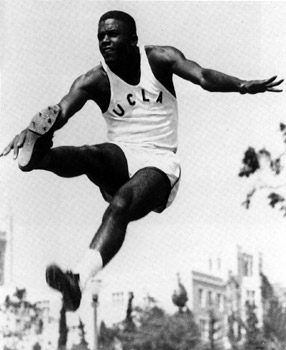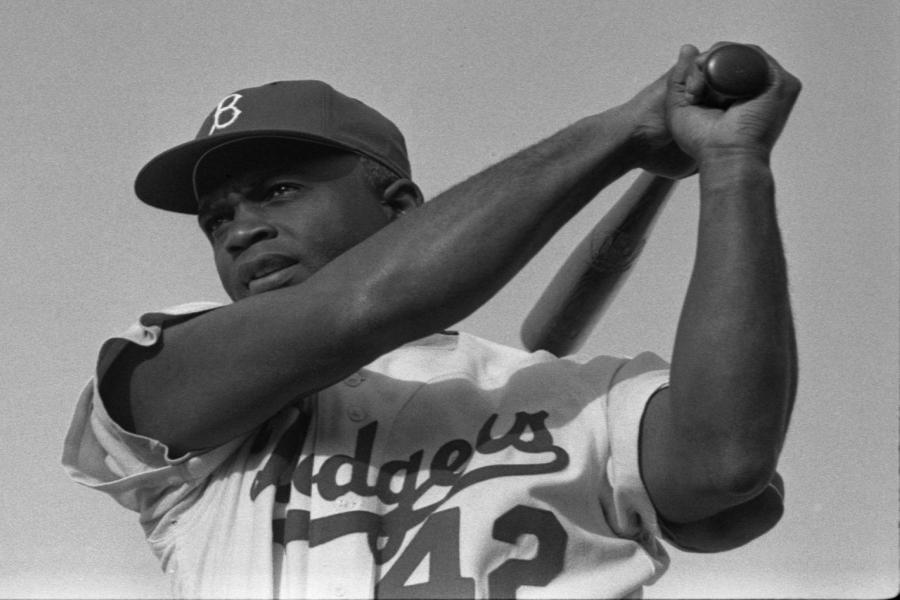Jackie Robinson’s legacy impacts sports for generations to come
February 12, 2016
Stepping up to the plate, Jack “Jackie” Robinson prepares to hit the ball out of the park.
Blocking out all of the racial slurs, he stays focused on the ball.
All that seems to matter to him is his love of baseball, not the barriers his color creates.
“How you played in yesterday’s game is all that counts,” Robinson once said.
When thinking of civil rights activists, many people picture individuals like Rosa Parks and the Rev. Martin Luther King Jr., not generally Robinson.
However, Robinson made many civil rights advancements for black athletes that have been enjoyed for years after he walked off of the field.
With his drive and strong-willed personality, Robinson changed the way baseball would be played forever.
Born in Cairo, Ga., on Jan. 31, 1919, he was the youngest of five and raised in poverty by his single mother.
During his high school years, Robinson participated in football, basketball, track, and, of course, baseball.
He was even named the region’s Most Valuable Player in baseball in 1938.

Jackie Robinson long jumps for UCLA.
After being inspired by his older brother Mathew, who had won a silver medal in the 200-meter dash of the 1936 Olympic Games in Berlin, Robinson pursued his love of athletics at the University of California, Los Angeles.
There, he was the first athlete to earn varsity letters in four different sports.
Because of financial reasons, he dropped out of school shortly after joining the semi-professional Honolulu Bears football team.
This too was cut short due to the start of World War II, during which he served as a second lieutenant in the United States Army for two years.
At boot camp in 1944 at Fort Hood, Robinson refused to give up his seat and move to the back of a segregated bus, which led to his arrest.
Because of his impeccable reputation in the Army and help from the NAACP and newspaper coverage, all charges were dropped against him and he received an honorable discharge.
This was one of the first important steps on Robinson’s moral road to equality and civil rights.
Senior Deitrick Young is thankful for all of the contributions Robinson made toward advancing civil rights.
“As a varsity basketball player and track participant, I am very grateful for everything Jackie Robinson did,” Young said. “He not only advanced civil rights in sports but also just in the general world.”
After his time spent serving in the Army, Robinson began playing baseball professionally in a league for blacks.
After some time, Robinson was spotted by Branch Rickey, president of the Brooklyn Dodgers, who offered Robinson a spot on a farm team for the Dodgers, the all-white Montreal Royals.
After attending spring training in Florida, Robinson played his first game for the Dodgers on April 15, 1947, as the first black player to compete in the major leagues.
Rickey warned Robinson of the racial tension he would soon face, but Robinson endured.
Other teams, spectators, and even some of his teammates were against his participation on the team. But none of their objections stopped Robinson from playing the game he loved — not even threats made against him and his family.
Despite the racial abuse he received, Robinson started off his career with the Dodgers in an impressive manner, leading the international league with a .349 batting average and .985 fielding percentage.
In his first year, he hit 12 home runs, helping his team win the National League pennant.
He was also named rookie of the year, and in 1949, he led in stolen bases, earning the National League’s Most Valuable Player Award.
Leo Durocher, the Dodgers manager, was dedicated to Robinson.
Even at games where players from both teams would threaten not to play if Robinson did, Durocher would stand by Robinson’s side.
The team’s shortstop and captain, Pee Wee Reese, also supported Robinson. Reese once walked up to Robinson on the field and put his arm around him while he was being harassed.
“I’m not concerned with your liking or disliking me …. All I ask is that you respect me as a human being,” Robinson said.
Eventually, his success led him to be the highest-paid athlete on the team, his accomplishments paving the way for other black baseball players.
He even testified in 1949 on discrimination before the House Un-American Activities Committee.

Jackie Robinson poses in his Brooklyn Dodger’s uniform in 1950.
He also publicly called out the Yankees in 1952 for not breaking the color barrier after five years of his playing with the Dodgers.
After years of training, hardship, and faith, his hard work paid off. He helped the Dodgers win the World Series in 1955.
After retiring from baseball, Robinson continued his efforts to bring equality to baseball and everywhere else.
He served on the board of the NAACP, lobbied for greater integration in sports, and contributed to the establishment of the Freedom Bank, owned and controlled by blacks.
In 1962, he was inducted into the Baseball Hall of Fame, and his number, 42, is now retired.
Even after Robinson’s death in 1972, his legacy still remains unbroken.
His wife has since started the Jackie Robinson Foundation, dedicated to honor his life full of accomplishments, which provides scholarships and mentoring programs to young people.
An acclaimed film, called “42,” covering Robinson’s life during the time he played baseball also came out in 2013, which highlighted some of his greatest successes and obstacles.
Annually, on April 15, the Major League Baseball community celebrates Robinson’s contributions to baseball and his first game with the Dodgers, which occurred on that date, by all players of both teams at the game wearing the number 42.
Today, thousands of people look back on Robinson’s life and are thankful for everything he has done to advance equality on and off of the baseball field, including freshman Allison DePottey, who has previously played softball.
“You do not have to be black to understand the importance of what Jackie Robinson did,” DePottey said. “He really changed all sports for the better. Who knows? Without him every sport still might be segregated.”
Without Robinson’s perseverance to make baseball an integrated sport, the game would never have seen such a positive and dramatic change.
His efforts to bring equality to sports cultivated the way for other great changes and more black athletes to pursue their dreams.
Robinson once said, “A life is not important except in the impact it has on other lives.”
Robinson’s contributions to the well-being of this country will never be forgotten. They made a monumental impact on the nation that will last for generations to come.
Information for this article was found on biography.com.
